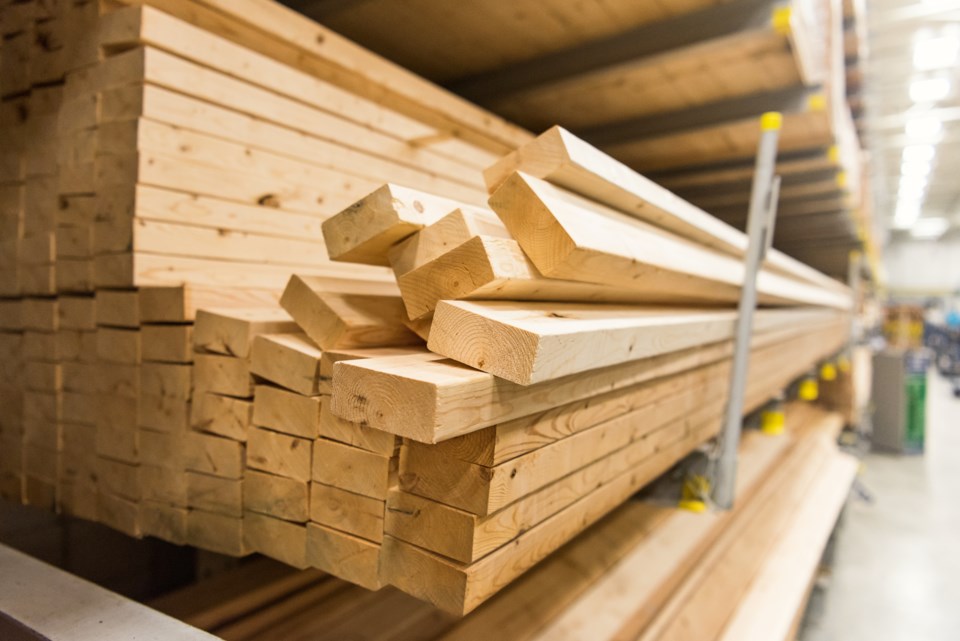THUNDER BAY — A proposed huge jump in duties imposed by the United States on Canadian softwood lumber has prompted both industry and labour groups to call for government intervention and a change in direction.
The U.S. Department of Commerce is poised to increase the combined softwood duty from the current 14.4 per cent to 34 per cent this summer.
Unifor, which represents 22,000 forest industry workers, said Tuesday it's time to reduce the industry's reliance on lumber exports.
"Canada must think big on forestry and use our vast lumber resources to facilitate a national affordable home building strategy," it said.
The union described it as an opportunity to address two crises with one made-in-Canada plan to build the houses the country desperately needs.
"We must reduce our historic dependence on exporting lumber and adapt Canada's forest industry. The lumber is grown here. Now we must process and build it here," said spokesperson Daniel Cloutier.
In the short term, he said, employers need immediate supports to keep workplaces operating, and income supports for workers facing job curtailments or layoffs due to the increased duties.
The Ontario Forest Industries Association also spoke out Tuesday, saying the federal government should establish loan guarantees to help sawmill operators access cash.
"They've been collecting duties since 2017. There's about $7 billion of Canadian lumber producers' money at the border. That is money that could be used to invest in communities, reinvest into mills, make our mills more competitive in Ontario and in Canada, and currently just sitting at the border collecting interest," said Ian Dunn, president and CEO of the OFIA.
At the provincial government level, Dunn said Ontario should encourage the federal government to prioritize negotiations with the U.S. while promoting new opportunities in the domestic market.
"Just today, we saw a letter from the Minister of Energy encouraging Ontario companies to develop an entirely Ontario supply chain in the energy sector in their procurement. I think this represents a really exciting opportunity for the forest products sector."
He said a number of companies, including Thunder Bay Pulp & Paper, take forestry material and turn it into energy, electricity, transportation fuels and gases for industrial purposes as well.
"There's an opportunity here to utilize an entirely made-in-Ontario supply chain and low-carbon, carbon-neutral feedstock and turn that into energy, something Ontario desperately needs, and diversify away from US imported natural gas, particularly in the GTA."
Dunn also echoed Unifor's call for government support for the construction of new homes to address the housing affordability crisis.
He suggested, however, that Northwestern Ontario mills are in relatively better shape than in other parts of the province, because the industry is more integrated.
"You have an OSB mill in Barwick, you have the laminated strand board mill in Kenora, you have Thunder Bay Pulp & Paper, you have Dryden Fibre. All those facilities act as markets for the sawmill residuals, and for lower-quality trees in the forest that can't be turned into lumber. (But) they're certainly facing this very same concern that every sawmill, every lumber producer in the country is facing right now, which is unprecedented 34 per cent duties at the border."
President Donald Trump has issued an executive order deregulating logging in national forests and other public lands in a move to boost lumber production in the U.S. and reduce imports from Canada.
Dunn called that "very concerning" while at the same time questioning how effective the measure might be.
He said a number of mills have closed in the U.S. south in recent years, and that "you can't just flip a switch and increase domestic production."
Dunn also noted American home-builders typically prefer SPF (spruce, pine, fir) lumber produced in Canada, because it's lighter and easier to work with.
Thunder Bay-Atikokan MPP Kevin Holland, the associate ministers of forestry and forest products, has expressed disappointment in the planned U.S. duties, saying the unpredictability of the Trump administration has made it more difficult for planning purposes.
"If we had some sort of measured response or measured program coming out, it would be easier to deal with. Having said that, our government is fully prepared for what it is we're dealing with, and we're going to do whatever is necessary."
Holland added that "Ultimately this is a federal issue as this duty applies to the forestry sector all across Canada. We will work very closely (post-election) with the new administration federally here to make sure the needs of the Ontario sector are being understand and are being incorporated into whatever plan the federal government ultimately decides to move forward on."
For the short term, the Ontario government has announced an $11 billion relief package to help businesses deal with U.S. tariffs and duties.
Holland said the forest industry is one of the sectors that will benefit from that assistance.
